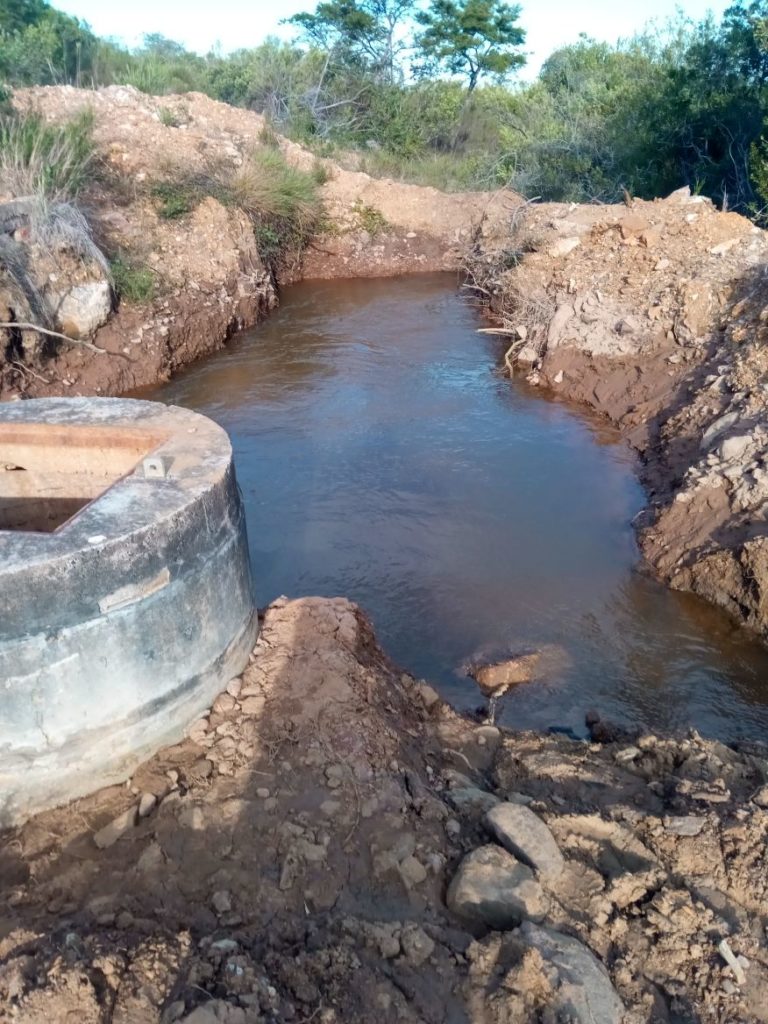Three weeks after the alarm was raised about e.coli in Makana’s water, there is still no official confirmation that the water is safe to drink, and the municipality’s advice to boil it remains. This comes as testing by staff from the Department of Water and Sanitation is under way this week in Makana and after privately conducted tests on the water in Currie Street in Grahamstown show that the water at that site is once again safe for drinking.
Weeks of concern about poor water quality led to a protest Thursday 31 May in which angry residents left buckets of muddy looking water and sewage outside the Makana Council Chamber. Unemployed People’s Movement Ayanda Kota told officials the municipality was treating residents with contempt and said the protest was to assert citizens’ dignity and humanity.
Deputy Director of Water Services Regulation at the Department of Water and Sanitation, Neville Lawry, on Monday 4 June confirmed to Grocott’s Mail that DWS is this week conducting tests on the water at Alicedale, Grahamstown and Riebeeck East. The results were not yet available at the time of publication.
The test results of samples taken at Carara Agro Processing’s Currie Street site were shared on Monday 4 June by managing director Mike Duxbury. Because of unreliable municipal water, Duxbury has invested R1.4 million in securing water supply and safety, including in-house filtration and chlorination equipment. All incoming water is treated before it is used in the factory.
This (re)treated water is required by Carara’s overseas clients to be regularly tested by an accredited laboratory. A sample of unretreated tap water in the area, taken on 7 May, was sent to this laboratory. Results showed coliforms at 10 cfu/100ml (the SANS 241 standard is <10), e.coli at 8 (SANS 241 standard is 0) and total microbial activity at 4100 (SANS <1000). SANS 241 is South Africa’s water safety standard.
The results, on samples taken in Currie Street on 21 and 28 May, show them to be well within the safety limits for potable water according to SANS 241. Both results record no growth of e.coli or coliform bacteria. The latest result records total microbial activity at a quarter of the level considered unsafe.
Makana’s advice to residents as of Monday 4 June remained that they should continue boiling water as a precaution. Makana issued a notice on 21 May, warning of high e.coli levels in the water and advising residents to boil it before drinking it.
It was revealed in Council documents and portfolio committee meetings on 16 and 17 May that in the absence of chlorine gas and sodium hypochloride, swimming pool tablets were being used to treat drinking water destined for taps in Alicedale and Grahamstown. Chemicals were finally delivered on Thursday 24 May.
“We will issue another notice when everything is fine,” Infrastructure Director Dali Mlenzana told Grocott’s Mail on Monday 4 June. He had not yet responded to a request for updated information about water safety by the time of publication.
Meanwhile, a massive pipe break, discovered Thursday 7 June, has left some residents without water for as long as three week. Photos and more information at bit.ly/GrocLeak
MORE ONLINE: * Poo protest * Why the water looks muddy and what Makana is doing about it * Water and infrastructure and the new Budget: bit.ly/GrocBadWater3
‘More with less’ – Nkwinti
To mark his first 100 days as minister of the Minister of Water and Sanitation, Gugile Nkwinti on Wednesday 6 June issued a statement outlining his five-pillar turnaround strategy:
- A National Water Resources and Services Authority
- A National Water Resources and Services Regulator
- A Water Resources and Services Value Chain
- A Water Resources and Services Master Plan
- Institutional Rationalisation and Organisational Alignment
Key to his plans, Nkwinti said, was a culture of “achieving more with less” in the department. It would:
- Use its own Construction Unit for infrastructure projects instead of service providers, to reduce unauthorised, irregular, fruitless and wasteful expenditure.
- Engage National Treasury and the Department of Cooperative Governance and Traditional Affairs to address billions of unspent, or irregularly spent municipal grant funds.
- Involve local people in subcontracting.
- Streamline the department’s organogram pending engagement with unions.
Dam levels continue to drop
The dam levels in the Eastern Cape during winter have dropped slightly by 0.8% from 66.9% last week to 66.1% with levels dwindling week on week, the Department of Water and Sanitation reported in their weekly update issued Thursday 7 June. The Eastern Cape remained a disaster province as announced by the Department of Cooperative Governance and Traditional Affairs earlier this year, with Kouga Local Municipality on the verge of running out of water.
Kouga Dam which supplies Hankey, and Patensie and surrounding farms is at 8.5%. During the same period last year, the dam was at 20.4%.
The Department’s weekly report shows that five dams in the Algoa Water Supply System in the Nelson Mandela Bay have declined from 21.5% last week to 21.3%. Last year at this time water levels in this system were at 37.5%. While Amathole Water Supply System with six dams serving Buffalo City Metro declined by 0.2% this week, this system stands at 91.5%, compared to this time last year when it was 68.9%.
RELATED ARTICLE – more details on: * Poo protest * Why the water looks muddy and what Makana is doing about it * Water and infrastructure and the new Budget
http://www.grocotts.co.za/2018/06/01/sewage-protest-in-the-city-hall/


